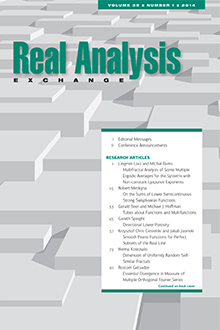Abstract
Let $A = \bigl \{b_0, b_1, \ldots,b_{k+\ell}; a_0,a_1, \ldots,a_{k+\ell} \bigr \}$ be a system of $2(k+\ell +1)$ real numbers such that $b_i \neq b_j$ for $i \neq j$, satisfying $\sum_{i=0}^{k+\ell} a_i b_i^p = 0$ for $p = 0,1,\ldots,k-1$ and $\sum_{i=0}^{k+\ell} a_i b_i^k = L \neq 0$. It is proved that if $f$ is measurable, and if $\sum_{i=0}^{k+\ell} a_i f(x+b_i h) = O(|h|^\lambda)$ as $h \to 0$, where $\lambda > k-1$, at each point $x$ on a measurable set $E$ then the Peano derivative $f_{([\lambda])}$ exists finitely $a.e.$ on $E$. This will extend a result of Ash [1]. It is further proved that if $p$ is a positive integer $\le k-1$ and if the upper and lower approximate Peano derivatives of $f$ of order $p$ are finite on a set $E$ then $f_{(p)}$ exists $a.e.$ on $E$.
Citation
S. Mitra. S. N. Mukhopadhyay. "An Extension of a Theorem of Ash on Generalized Differentiability." Real Anal. Exchange 24 (1) 351 - 372, 1998/1999.
Information





